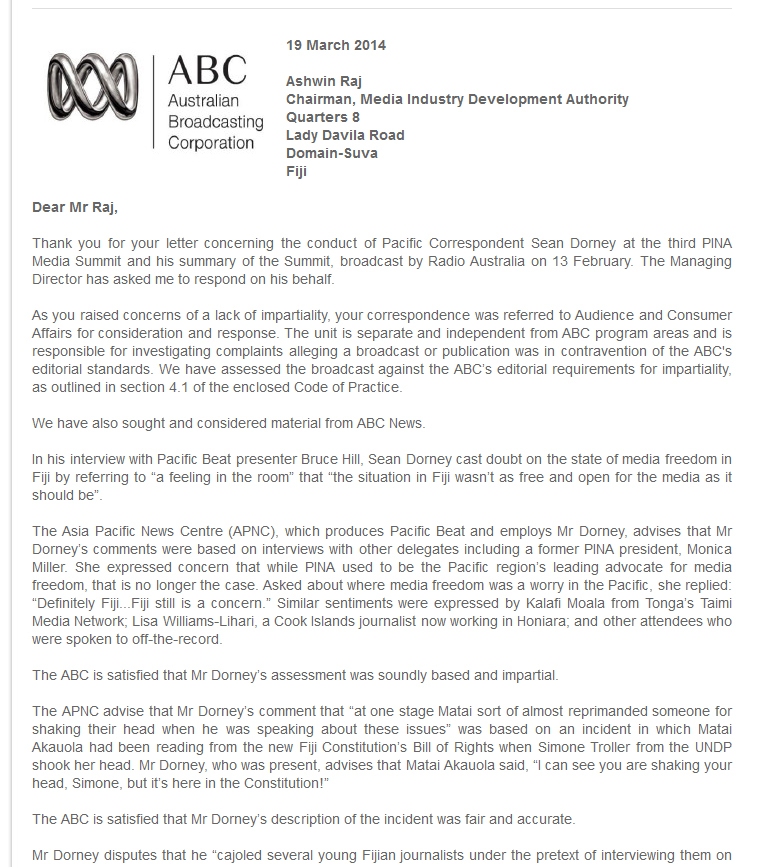How ironic. For two days this week, veteran Pacific affairs correspondent Sean Dorney from Australia Network was contributing hugely to an inaugural regional business media summit organised by the Asian Development Bank.
His final contribution to the seminar was a rundown on “tunanomics” and how illegal fishing was, for him, the biggest economic story confronting the Pacific.
He punctuated this presentation with an ABC video report from last October which exposed how lack of cooperation by at least six Pacific countries was undermining the Forum Fisheries Agency’s surveillance efforts.
Anthony Bergin, the Deputy Director of the Australian Security Policy Institute, estimates that about US$1.7 billion is lost through illegal and unregulated fishing activity in the Pacific. He’s proposing that the Australian patrol boat programme should not only be a Defence Department commitment but that Australian aid should also contribute to the programme now being developed to replace those 22 patrol boats that Australia has donated to Pacific countries but which are coming to the end of their work life.
No sooner than his fine contribution and the ADB seminar was over, Dorney found himself in the gun again with Fiji media "control freaks" - Dorney's description - who seem determined to use the controversial 2010 Media Industry Development Decree to gag anything deemed to be “un-Fijian”.
And this seems to include every shred of criticism from the foreign media.
Although this issue never really made it to the floor in this media seminar, there was a lot of muttering behind the scenes over a complaint of alleged bias by Dorney in his reporting from recent Pacific Media Summit in Noumea, New Caledonia, sent from the decree bureaucracy octopus MIDA (Midas would be more apt after the Greek mythological king who turned things to gold but ended up dying of starvation).
'New era'
MIDA, or the Media Industry Development Authority, was supposed to be the new media accountability agency that was going to oversee media freedom and freedom of expression and usher in a new era of political discourse and discussion leading to the September 17 general election.
Instead, the chief MIDA moguls, USP academic Ashwin Raj and former Pacific Islands News Association (PINA) general manager Matai Akauola, have set themselves the task of finding ways to zip-up foreign journalists (and more than a few locals).
Both men are pleased with the existing blacklist topped by Dorney (ABC – Australia), Barbara Dreaver (TVNZ – NZ) and Mike Field (Fairfax Media – NZ). But they don’t want it to end there.
More names are wanted for the banned list, and the ABC’s Campbell Cooney has also been mentioned for a “dishonourable” recommendation.
What did Dorney say in his Noumea report that was so “offensive”? Well, for a start he merely said that “there was a general feeling that there is not much media freedom in Fiji”.
And MIDA wants a retraction from the ABC? Hardly.
 The ABC response on March 19 said the media organisation was "satisfied that Mr Dorney's description of the incident was fair and accurate".
The ABC response on March 19 said the media organisation was "satisfied that Mr Dorney's description of the incident was fair and accurate".
At the MIDA media conference announcing the establishment of a "bias" monitoring unit, Raj was reported to have told Pacific Freedom Forum (PFF) coordinator Ricardo Morris he would have to choose between being a journalist and an advocate (he is also editor of the monthly news magazine Republika).
Defending advocacy
Morris defended the right of journalists to speak out for themselves on media issues.
Café Pacific publisher David Robie branded the MIDA media tightening up development as “mind-boggling” at a time when MIDA should be pulling out all stops to restore a vibrant and fearless political debate in Fiji during the return-to-democracy election campaign.
Back at the ADB media summit in Sydney: This was an excellent occasion for all 20 senior media people from eight countries who took part and was a reminder of how constructive things can be when the divisive political baggage is left at the door.
As well as Dorney, a relentless critic of PINA, there was PINA head himself, president Moses Stevens, from Vanuatu, who appealed to the ADB to assist Pacific media to face “the challenges of infrastructure, manpower and the business aspects of our industry”, and the deputy chair of rival Pacific group Pasifika Media Association, Kalafi Moala of Tonga.
Moala again had a message of “collaboration” for the Pacific media.
The opening day was focused on the ADB in Pacific development; the Pacific economic outlook; the private Sector Development Pacific Initiative aimed at building up the business environment in the region; and the A$1.3 billion Pacific Region Infrastructure Facility.
The final day was instead directed at media issues, such as the Pacific media business outlook; “coconut wifi” with internet, mobile and digital technology changes; gender and business; and a lively final session discussing the region’s “biggest stories”.
Read the full blog text on David Robie's blog
The MIDA papers - Raj vs Dorney
Video below: Sean Dorney's presentation ABC report on illegal tuna fishing in the Pacific on 28 October 2013.



